Welcome to another issue of The Newport Cornucopia where we dig through the newspapers archives for interesting news articles and adverts. All articles are posted verbatim and most headlines are original (headlines in quotes are my own).

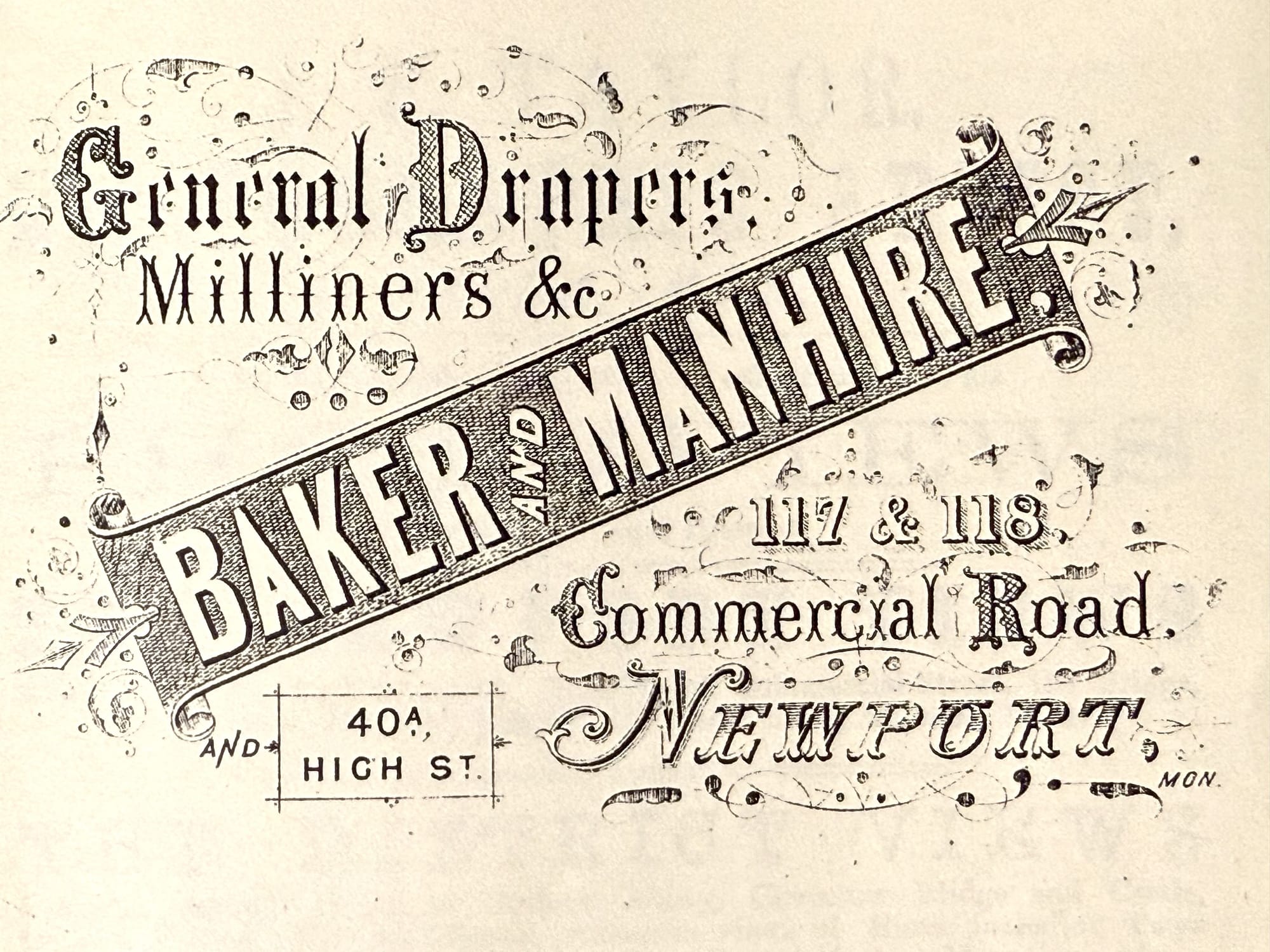

'Public Urinals in 1854'
From the Surveyor's Report published in the Monmouthshire Merlin.
My attention has been directed to the necessity for some additional public urinals, and I think that the following places will be suitable for their erection, provided no objection will be made by the parties near whose property it is proposed to construct them:—
- Lane near Carpenters' Arms
- Mill-street, near George and Dragon
- New Road, near Master's Corner
- Top of Friars'-fields, near Commercial-street
- Canal Side, near Llanarth-street
- Another point or two near the line of the Monmouthshire railway, which may be determined when the works are more advanced.
— Monmouthshire Merlin, 2nd June, 1854
Master's Corner
Also mentioned in the Surveyor's Report is Master's Corner.
New Street
I am informed by Mr Sawyer, that the road from Master's Corner to Market-street, will be made forthwith; and that he is endeavouring to make it the full width of 22 feet, where 19 feet 10 inches was agreed to.
— Monmouthshire Merlin, 2nd June, 1854
What Was Master's Corner?
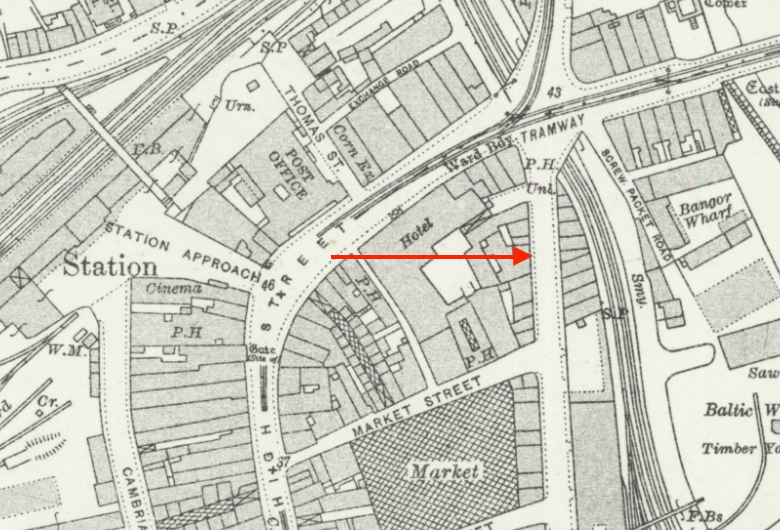
At 2 High Street, George Masters ran his Wine and Spirit shop which was there in at least 1848 where there is a mention in the street directory from that year. Prior to this Masters had a shop on Bridge Street as far back as 1830 where he also sold bottle porter.
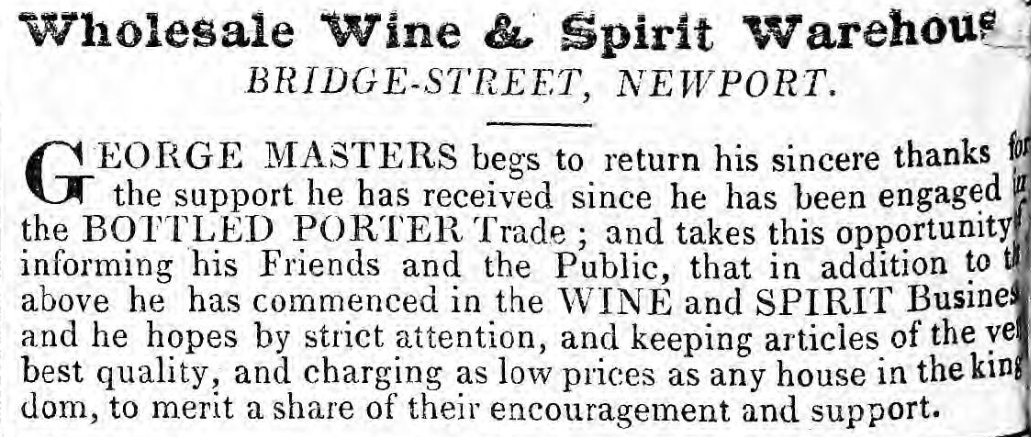
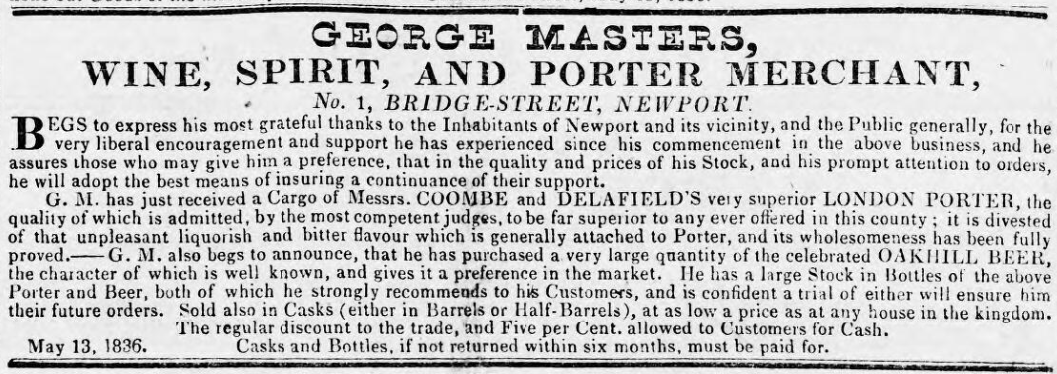
George Masters' Omnibus
George Masters was at the forefront of travel in Newport and in January 1845 he ran a scheduled horse-drawn omnibus from his shop on Bridge street to the Devonshire House, Pill calling at the Parrot Hotel along the way. It would also link up with the steam packets from Bristol and an additional service was offered where passengers and their luggage could be conveyed to any part of Newport.
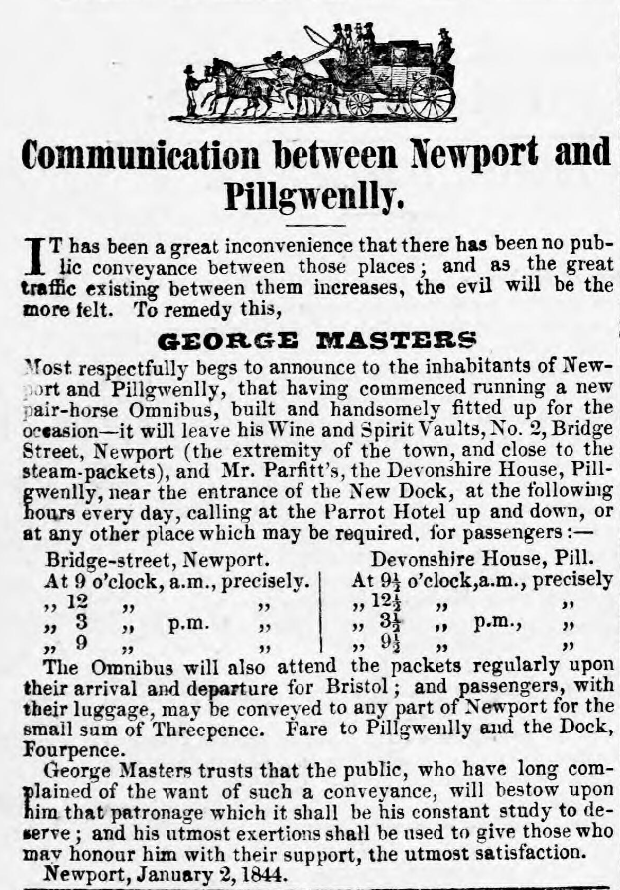
The Devonshire House was located on Dock Parade where the SDR is today. According to a street directory from 1876, there were two rows of buildings rather than the one in the map so the PH in the map is likely to be the Dock Hotel and Devonshire House may have been on the other side of the road.
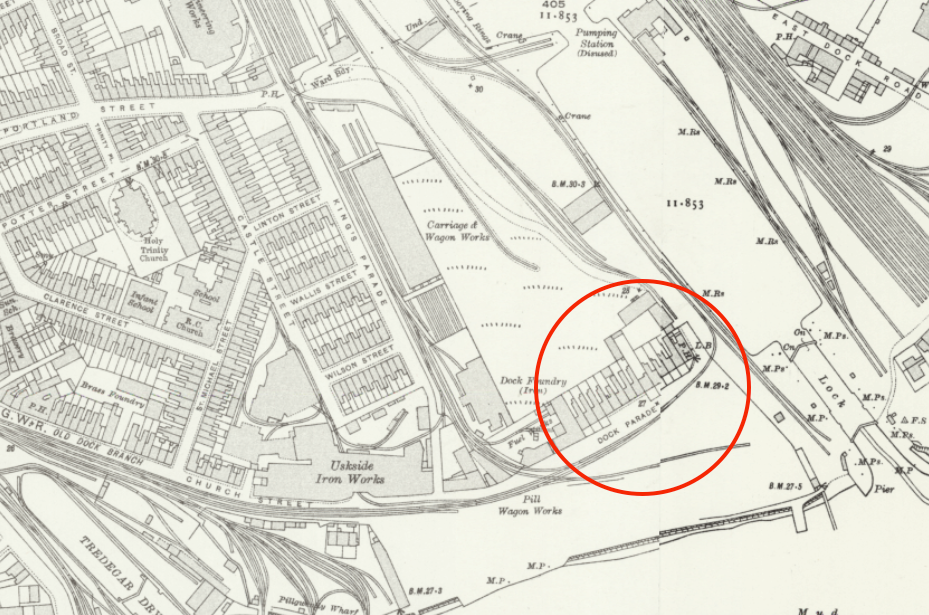
This older map shows the other row of buildings on Dock Parade.
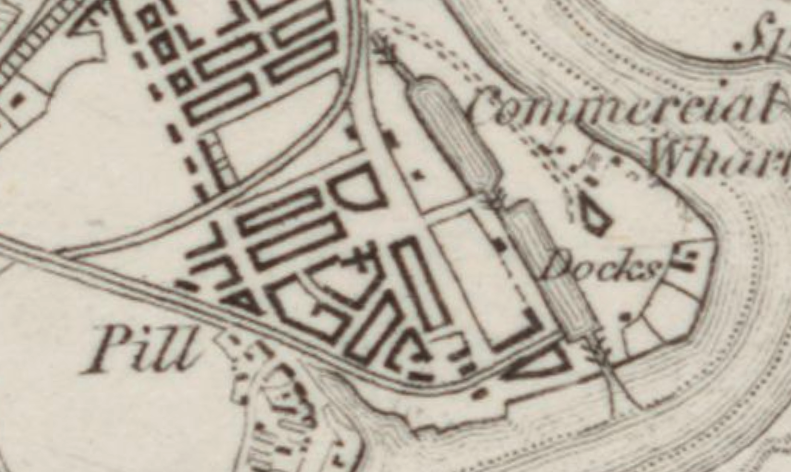

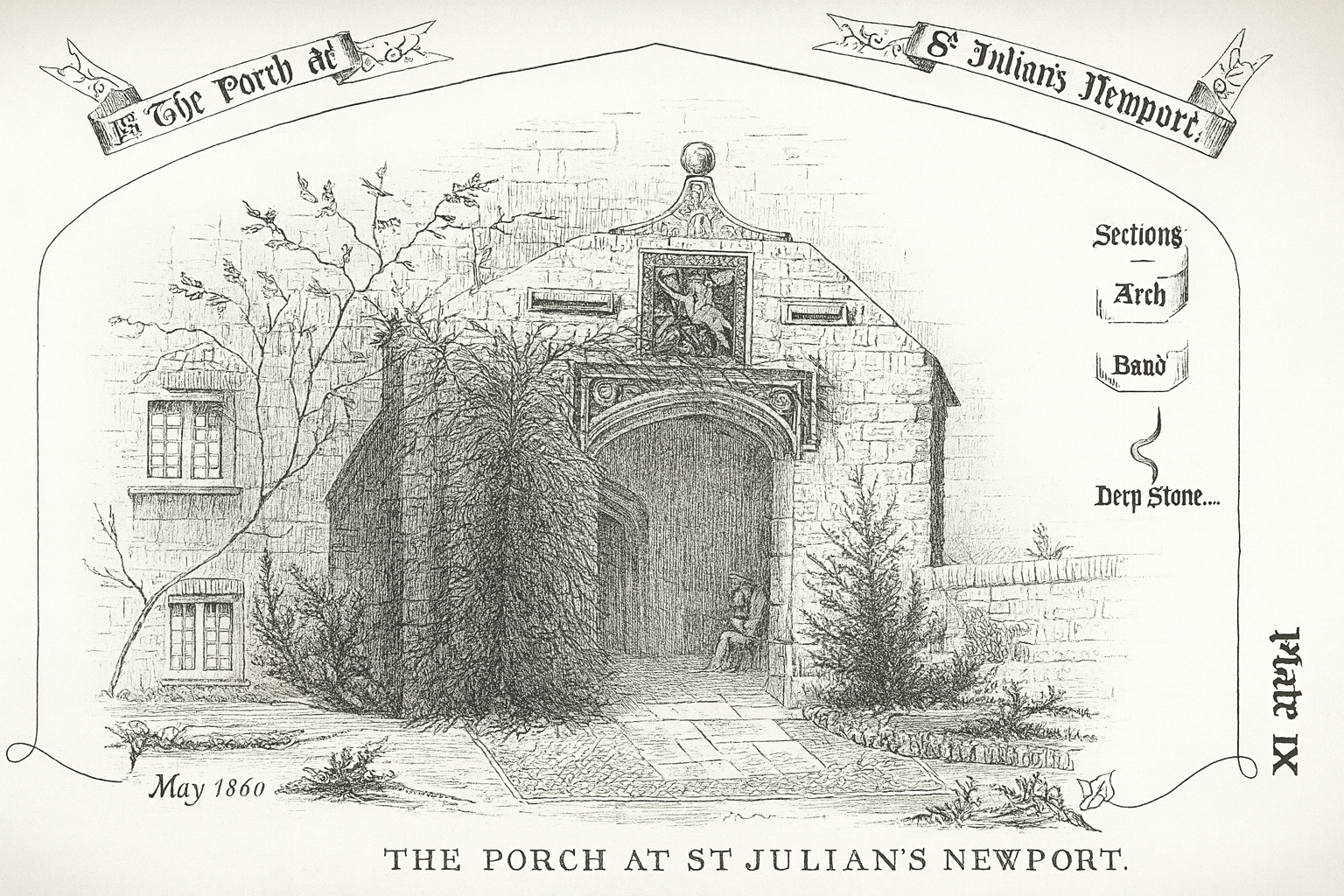


'The Adonis of Mary the Cripple'
John Yarwood, the Adonis of the celebrated Mary the Crip- ple, of Friars' Fields, was summoned for allowing card-playing in his beer-house; but it appearing that it was only a little family party, he escaped this time.
— Monmouthshire Merlin, 18th April 1846
'An Offer Of A Kiss To Be Let Go'
Louisa Hiley, a young woman, was fined 5s for being drunk and disorderly in Canal-parade, early on Sunday morning. The officer who proved the case said the girl offered to let him kiss her if he would let her go. (Laughter.)
— Monmouthshire Merlin, 28th September 1877
'Respectable Man Attacked in Friar's Fields'
A respectable looking person, named John Trafford, who says he has been many years in his Majesty's service' has called at our office, and stated, that, on the night of the 8th instant, he went from his inn to ascertain particulars respecting the death of the mariner, Wm. Kayle, when, on passing along the Friar's Fields, about eleven o'clock, be was assaulted by seven or eight ruffians, dressed as sailor, who peremptorily demanded a treat of drink.
Mr. Trafford in order to intimidate them, said he was an officer of police and that if they did not desist, he would lock them up; upon which, one of the fellows raised a club, and said that that was his staff of office, and struck him on the right side of the head, which nearly deprived him of his senses, and in that state he staggered into the Canal, from which he scrambled out with difficulty.
During the outrage he repeatedly called for succour, but none appeared, and he complains bitterly of the want of a police force in this town. Mr. Trafford has got a severe cold from the wetting, and declares that he will make known the unprotected state of his Majesty's lieges in Newport at the Secretary of State's office, where he will call early next week.
— Monmouthshire Merlin, 13th February 1836
Rogues at the Fair
Charles Macarthy and John Macrohan, the last-named saying he was the nephew of Supt. Macrohan, of Herefordshire, were charged on suspicion of stealing various articles, the property of Margaret Parker, who had a beer-booth at Stow Fair.
The prisoners were brought up by Constable Rees, upon whose evidence, aided by that of Mrs Parker, the Bench committed Macrohan to the house of correction, as a rogue and vagabond, for one month, with hard labour, and Macarthy for twenty-one days ditto. Stow fair day will be a black letter day in the calendar of the prisoner henceforward.
— Monmouthshire Merlin, 11th June, 1852
The Street Pests
Susan Travis, one of those foul beings who prowl about at the corners of streets, uttering obscene language, taking delight in shocking the ears of female purity, and committing vile indecencies, was to-day charged with drunken and disorderly conduct, and refusing to go home when ordered.
The offence was proved, and the Bench having expressed a determination to punish all such offenders severely, sentenced the prisoner to a month's imprisonment.
— Monmouthshire Merlin, 22nd August, 1846

'Newport Borough Police Force Outing to The Lighthouse'
The Newport Borough Police Force, with their wives and children, on Tuesday and Wednesday, enjoyed their Annual Outing. The Corporation contributed a small sum, to which ratepayers can take no exception, in view of the general efficiency and good conduct of the Force.
In addition, a number of the principal tradesmen contributed handsomely in token of their appreciation of the Borough constables.
The arrangements were under the control of Mr. Huxtable, the Chief Superintendent, who exerted himself with assiduity to promote the comfort and pleasures of the party.
The Lighthouse was selected as the scene of the festivities, and merrily the hours sped l amid the various sources of enjoyment which presented themselves on the shores of the Bristol Channel.
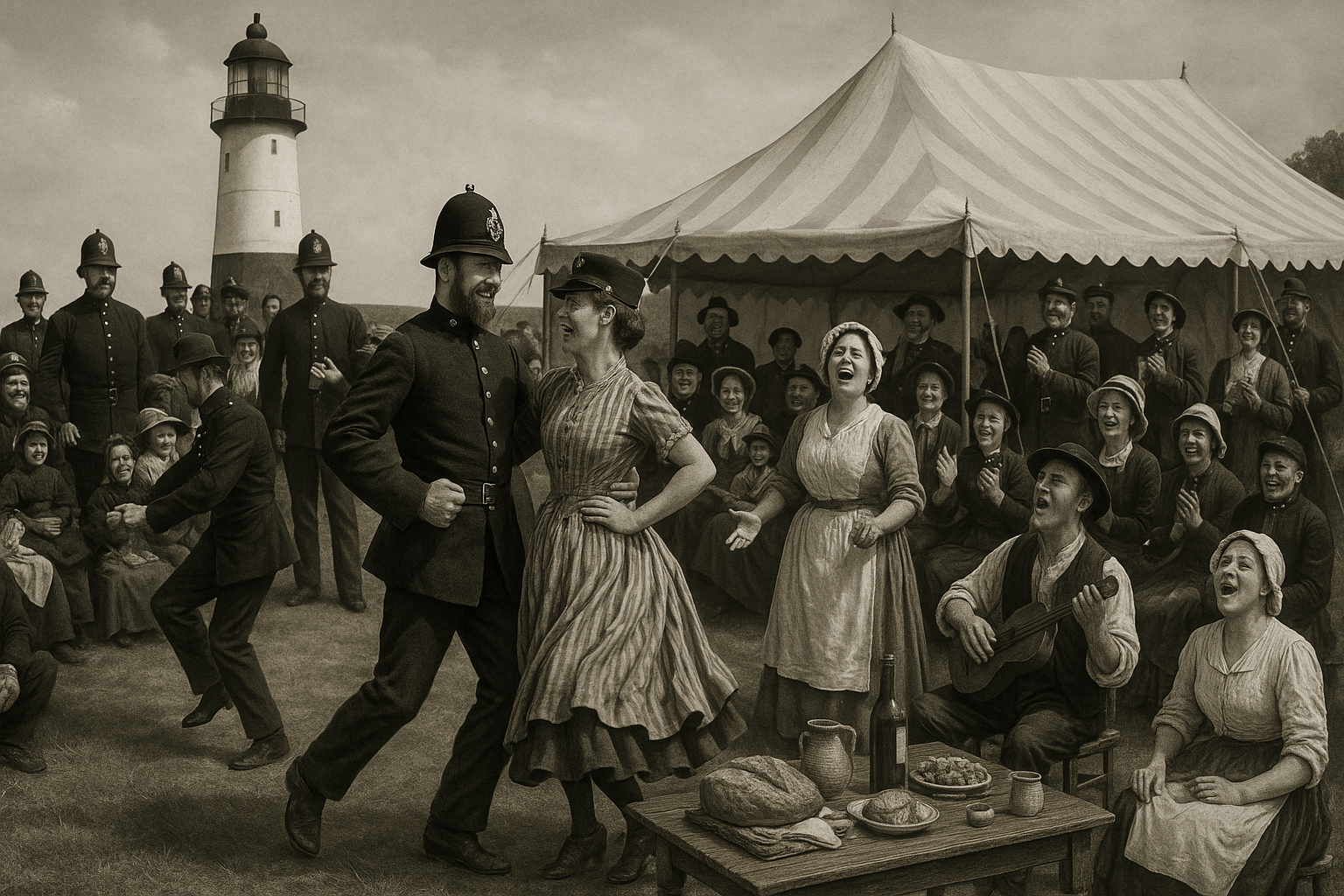
An ample supply of creature comforts was provided and spread in a commodious tent - musicians, whose skill was brought into frequent requisition by the lovers of Terpsichore, played throughout the day, whilst there were games in variety on day, whilst the green sward.
The most enjoyable aspect of all, to some, were the briney waters which sparkled in the sun, and as if instinct with jocund merriment, throwing spray against the sea-washed walls and at each other. The party was safely and pleasantly conveyed from the Lighthouse in commodious brakes at once stout and fleet tutored by Jehus of admitted experience.
— Star of Gwent, 12th October, 1872 (via Newport First Stop (1800-1900) by Derrick Cyril Vaughan)

'Black Polar Bear for the People's Park'
The Town Clerk read a letter addressed to the Mayor on the 23rd October by Mr. Councillor Mordey, stating that the latter had a "black polar bear" which he would be pleased to present to the town for the peoples' park. The keep of the animal would entail little expense, it was stated, and the gardener would be able to look after it.

The ex-Mayor said that on receiving the letter he replied that as he was going out of office soon he could not give the bear that attention which it required —(a laugh)— and that be thought it would be a most graceful act to present the animal to the incoming Mayor.
Alderman Murphy: Can the bear dance?
Mr. Mordey: Yes, Mr. T. Jones has had the bear ia his office and tried it. I think, it would be a, great addition to the public park, and if the Corporation would like to go the expense of digging a pit, timbering it, and putting a pole in the middle they shall have the bear. The bear is quite tame and a source of great amusement at my works, and Mr. T. Jones, who had it at his office, was quite satisfied with it. I have received nine offers for the bear, but am anxious that the town should have it,
Alderman Murphy proposed that the bear be accepted, and that the cost of keeping it be added to the Mayor's salary. If the bear proved an attraction in the public park it would prove a good speculation.
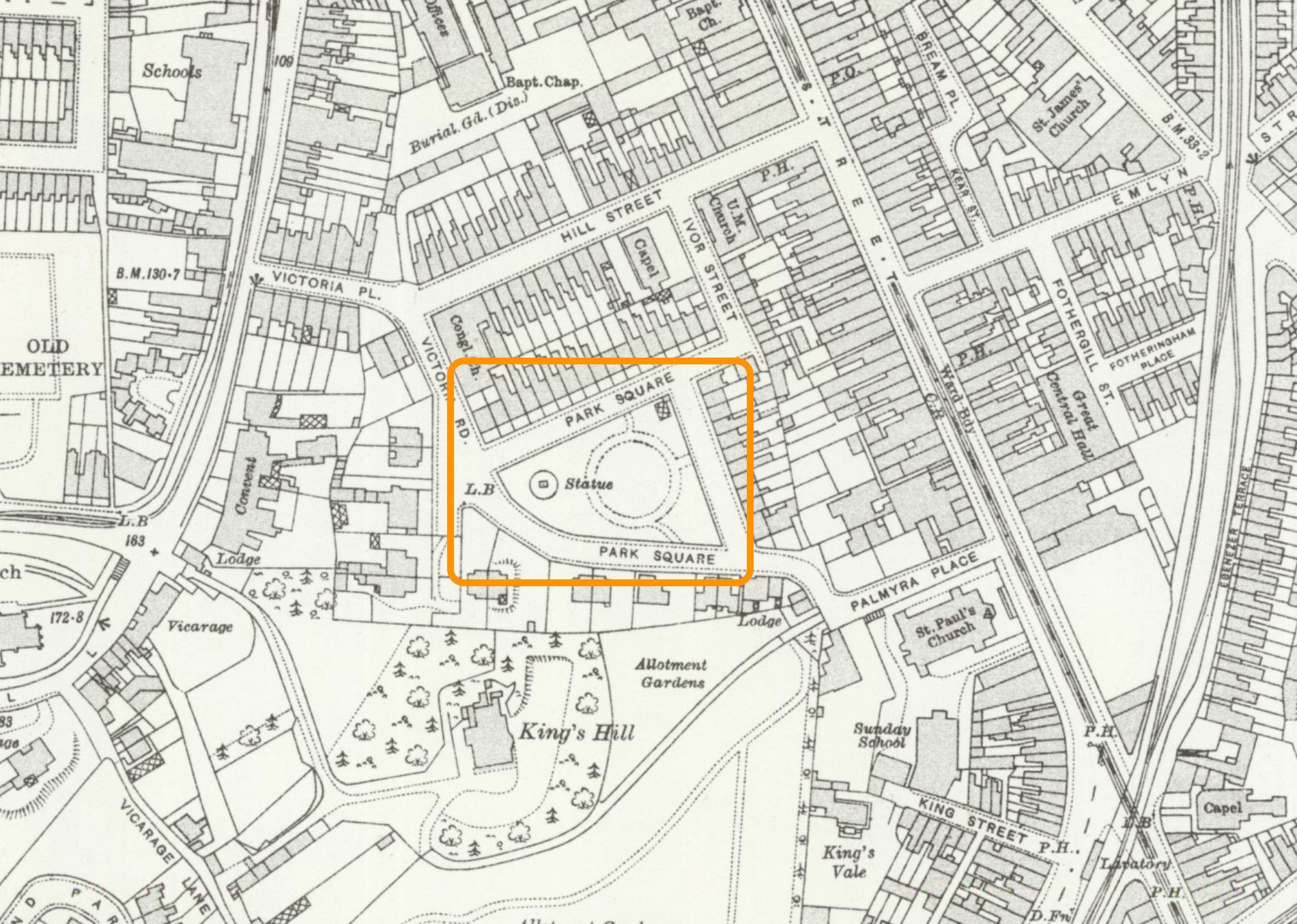
The ex-Mayor: If you are going to put the bear in that small public garden you will soon have no garden left.
The Surveyor: There is no space for a pit.
Mr. Mordey: I beg your pardon. I have been there myself, and there are places where a pit could be made. The cost of the pit would be about £20, and the cost of feeding a mere nothing; If the Mayor and Corporation do. not wish to accept the bear, I shall dispose of it to some private individual.
Mr. T. Jones begged to second Alderman Murphy's proposition. The statue in Park-square must be very lonely, and he thought it would be very nice to send the bear to play with the baronet.
Then as the square was largely frequented by nursemaids they need not trouble about food for the bear, as it would no doubt be able to pick up a baby or two. (Laughter.)
Its possession would add dignity to the Corporation, and on high occasions the animal might. be used to lead them to Church. It might also be useful in carrying round a collecting bag, and having a beautiful smile it would be able to win more than three-penny pieces on going round with the bag. (More laughter.)
The Deputy Mayor said the offer of the bear seemed to have degenerated into something like a comic farce. The bear would be of no use, and he was afraid it, was a sort of white elephant which having got Mr. Mordey did not know what to do with, and so he thought he would palm it off on the town. He proposed as an amendment that the Council decline the offer with thanks. Mr Faulkner seconded. The amendment was carried, only Mr. Mordey voting against.
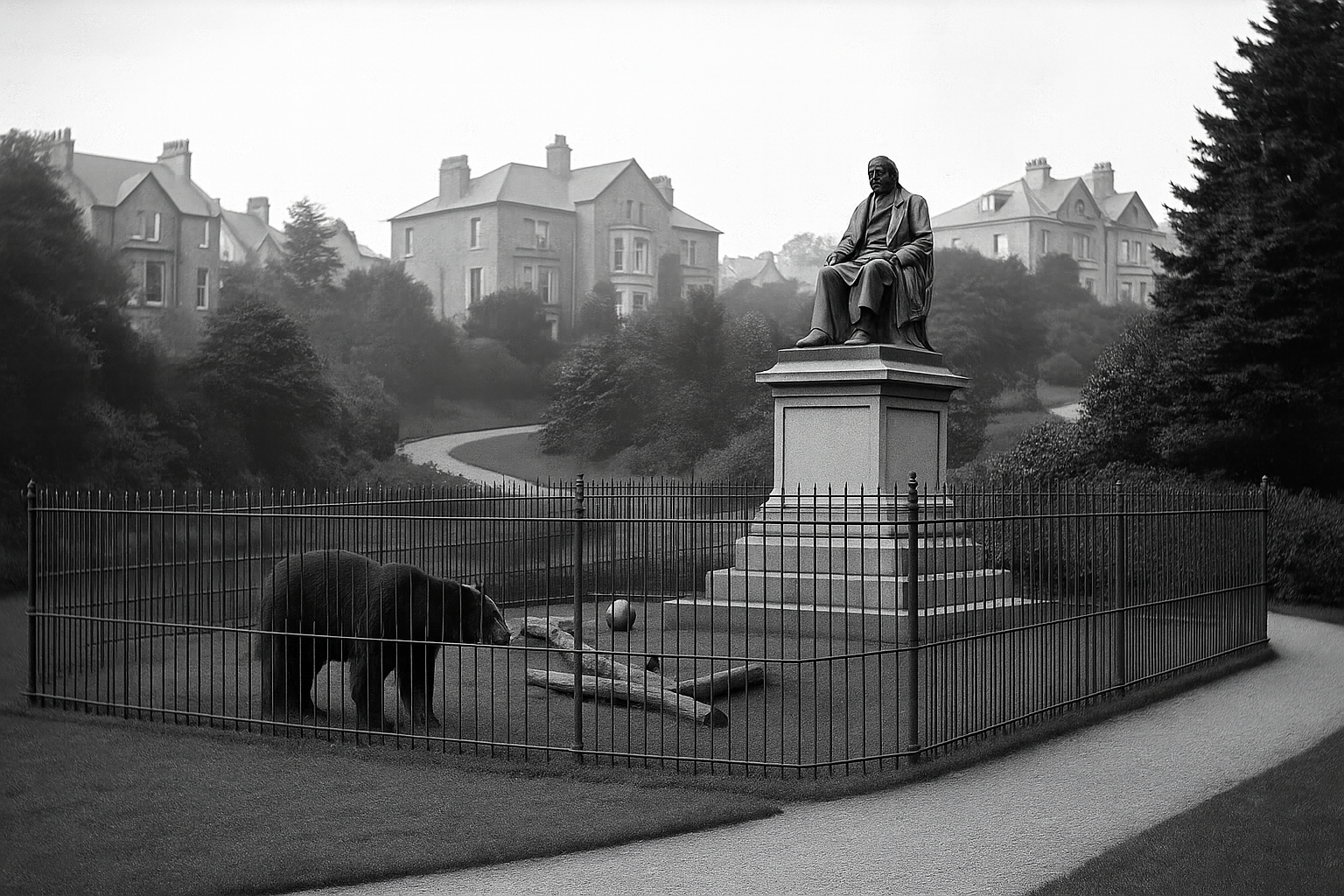
— Monmouthshire Merlin, 14th November, 1884

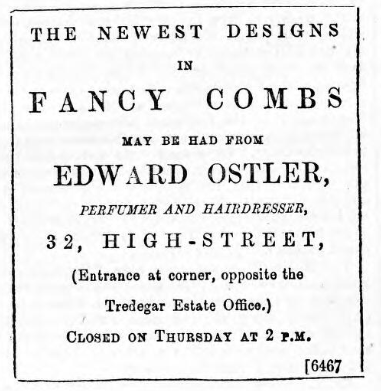
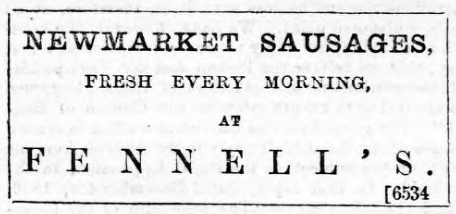
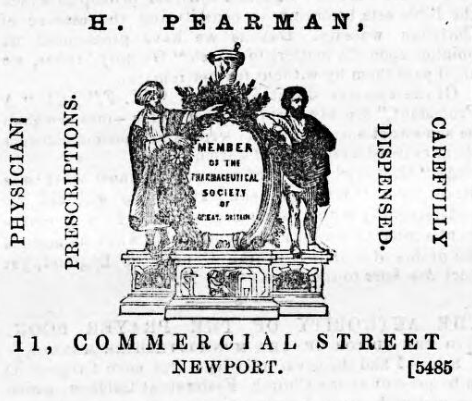

'Newport High Street Blocked by Cattle on Market Day'
Viator appears to be someone who lived outside of Newport and was a regular writer of letters to the Monmouthshire Merlin between 1830 and the 1860s. I'm sure if all are the same person or if Viator (traveler in latin) was a name used by multiple people.
The following letter is a complaint about the state of the High Street on Market day when it's clogged up with cattle.
To the Editor of the Monmouthshire Merlin,
Sir,—May I request the favour of a spare corner in your next publication, for tbe purpose of drawing the attention of the proper authorities to the subject of one of the greatest nuisances in, and which is really disgraceful to, the improving town of Newport.
On Monday week last, when coming up High street, which is the principal street and the greatest thoroughfare, I was surprised to find that the most frequented part of it, that is, from the Tredegar Arms nearly down to the Bridge Inn, was completely blocked up with cattle.
Upon enquiry I found that it was the, monthly market, and that every month this abominable nuisance is repeated.
The centre of the highway was occupied by bullocks and droves of ponies and some sheep, while the pavement was taken up by pigs, thus completely obstructing the entire passage through the street, and compelling persons to find their way at well as they could, through an accumulation of mud, filth, and nastiness.
In dry weather this is quite bad enough, but in wet weather it must indeed be horrible, more particularly for the female sex. I observed, too, that the pigs were fed, by having corn, &c-, thrown upon the pavement for them. Pigs at no time afford a very agreeable treat to the olfactory nerves, and here the inhabitants of High-street, at least of a great part of it, are obliged to suffer this intolerable nuisance because some steps are not taken to remove it.
In the evening, after the market was over, the street was quite offensive, and the next morning, instead of its being cleaned up, and the filth all cleared away, as in any well-regulated town, and more particularly a corporate one, it would be, it was suffered to lie, having the appearance more of an empty pig-stye than a decent street.
I was naturally led to inquire whether there was not a remedy for getting rid of this evil; but was told, "No, it is an old established market, and although means have been tried to remove it, yet it was found impossible."
Upon further enquiry, I learnt that a few years since an Act of Parliament was passed for the improvement of the town, and having procured a copy, I perused its contents. The title purports to be "An Act for lighting, watching, paving, cleansing, and improving the streets, &c., of Newport."
At page 37 I find that if any person or persons shall, in any of the present or future streets, lanes, roads, highways, passages, or other public places in the town and borough, expose for sale any horse, ass, sheep, pig, bull, cow, or other beast, except in any public market or fair, or in such place or places, as shall be appointed for that purpose by the mayor of the said borough for the time being (and the said mayor is hereby required to appoint a convenient place or places) or shall commit any public nuisance or annoyance whatever in the said town or borough (page 39), or shall cause any obstruction or impediment in any footway or causeway (page 40), or in any other manner obstruct or incommode, hinder or prevent, or shall wilfully permit, or suffer any horse , or other beast, or cattle to go thereon, shall forfeit a sum not exceeding forty shillings.
It has been said that the exceptive words mentioned in the first part of the above extract, that is to say, "except in any public market or fair," authorise the exposing for sale in the public street: if so, for what purpose were the words next following the above, inserted in the Act, which not only authorise, but absolutely require, the mayor of the borough for the time being, to appoint a convenient place. But even if the market held in the place where it is now is, does it follow that the pavement is to be occupied by pigs, thus compelling to the public to get along as well as they can? By such means an "obstruction" and an "impediment" are created in the "footway," and the free passage of the footway and the causeway is obstructed, incommoded, hindered, and prevented, and for suffering any beast or cattle, in which latter word pigs are included, to go thereon, the parties so offending are liable to be fined.
It appeals, then, that it is in the power of the mayor to remove this nuisance, alike disgraceful to the borough, and to the authorities, for not having removed it long since. If the mayor does not see to it, he omits doing his duty. Surely in a town like Newport many places might be found where the cattle market might be held, instead of occupying the entire street, by which means the public are so greatly inconvenienced, and more particularly as it is in that part of the town where the coaches stop, and where are situated the postoffice, several public offices, and principal inns, to which hundreds of persons are every minute resorting on business. I am not much acquainted with the localities of Newport, but surely if some little trouble was taken, a place might be found affording quite as good, and in fact, much better, accommodation, than at present. Newport is daily increasing in importance, aa a proof of which I need only refer to the splendid docks which have just been opened, and to the very elegant building in Commercial-street, the new council house. It is therefore to be hoped that those whose business it is to see to these mailers, will take some steps to remove a nuisance which is so truly disgraceful to the improving borough of Newport.
I am, sir, yours &c.,
VIATOR
— Monmouthshire Merlin, 5th November, 1842

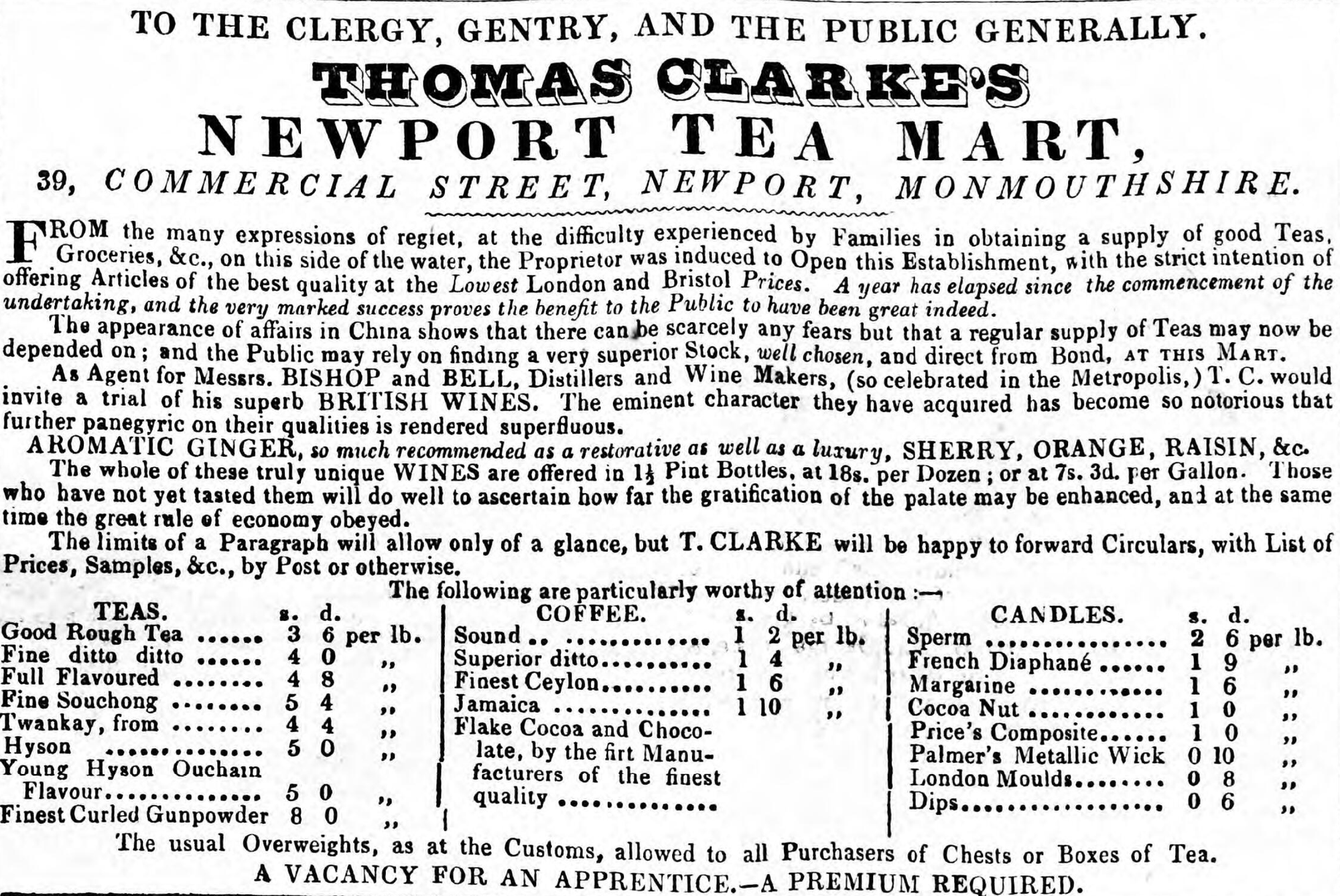

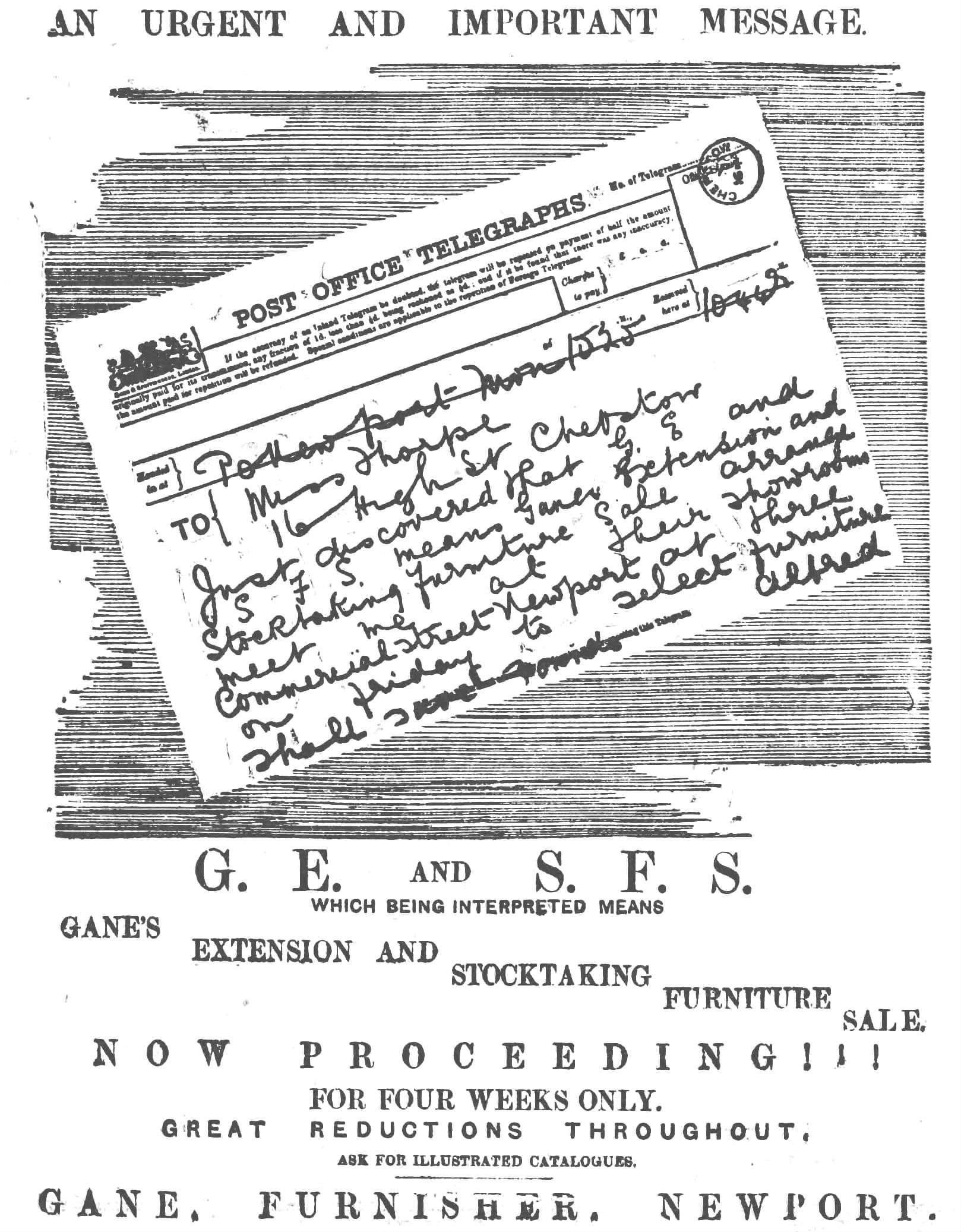

'Opening of Brynglas House'
On Tuesday last, this newly-erected mansion of Messrs. Allfrey was the scene of a most brilliant piece of festivity. The members of the Newport Cricket Club, which has been recently established under the presidency of R. J. Blewitt, Esq., of Llantarnam Abbey, and which bids fair to rival the most distinguished of the neighbouring clubs, met at an early hour in the morning on the lawn in front of the house, and after enjoying the whole day the delights of that noble and manly pastime, sat down at Messrs. Alllrey's table to an elegant dinner, provided with all the luxuries that the most fastidious taste could have desired. The bountiful richness of the repast was greatly enhanced by the urbanity and kindness of the joint hosts, who left no stone unturned (as the saying is) to show their visitors that they were indeed "Welcome."
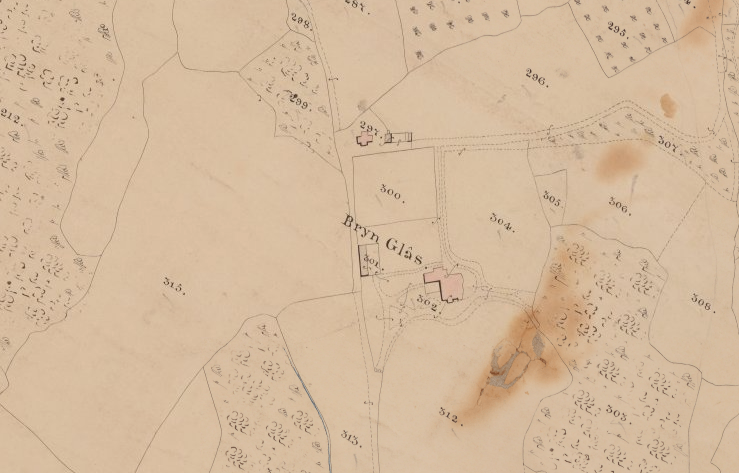
It is needless to say that under such auspices conviviality was prolonged to a late hour. Similar acts of hospitality are rare in this county, and it seems pretty generally agreed that the Messrs. Allfrey have offered an example well worthy of imitation. When wealth falls into such hands, Envy's self must be dumb.
— Monmouthshire Merlin, 27th September, 1834

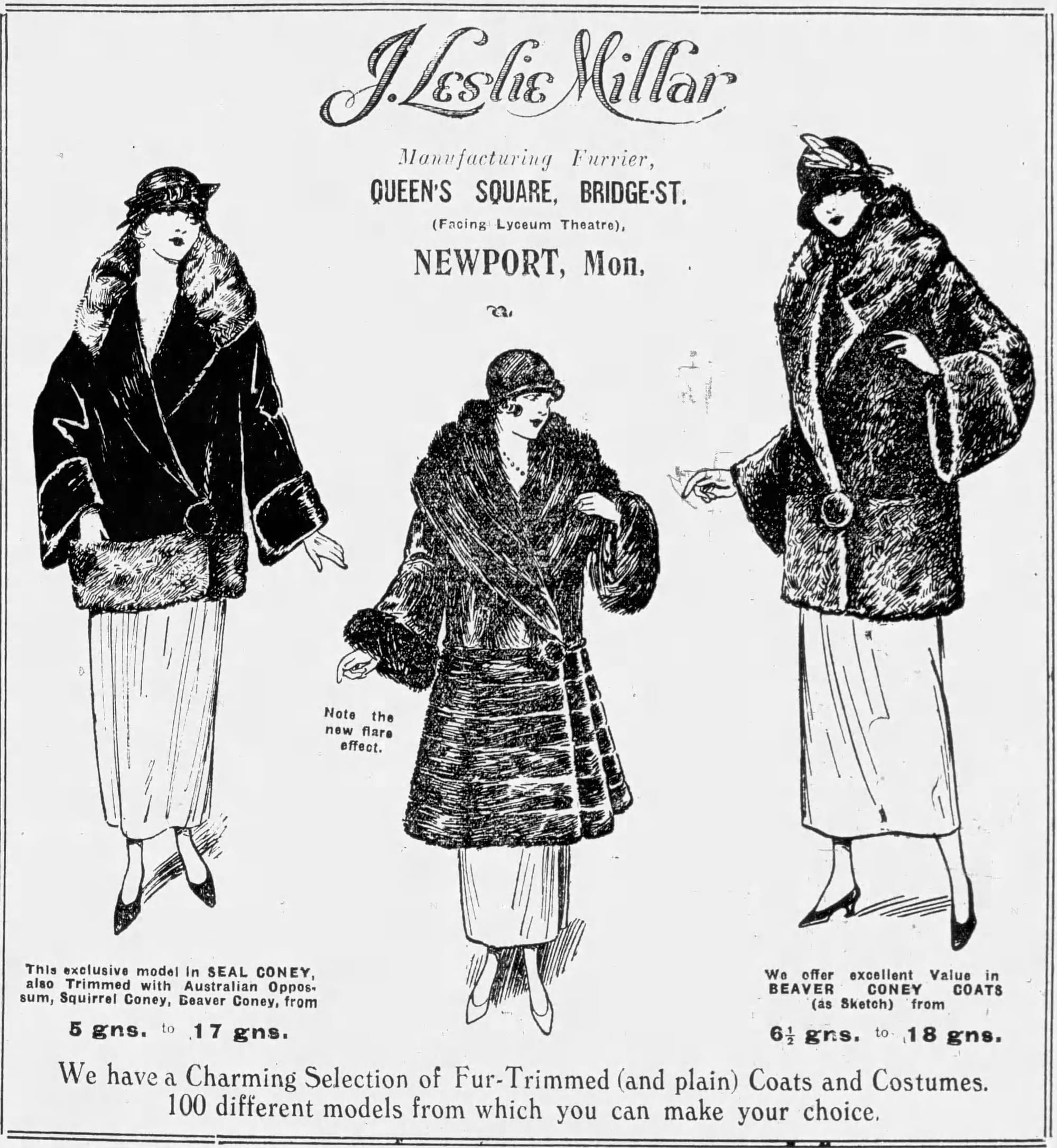

The Fire King
In October 1840, a celebrated fire eater by the name of Chylinski visited the Williams's Room in Commercial Street, Newport. He had toured Britain and this is how Harry Houdini described him in his 1920 book, Miracle Mongers and their Methods.
A Polish athlete, J. A. B. Chylinski by name, toured Great Britain and Ireland in 1841, and presented a more than usually diversified entertainment. Being gifted by nature with exceptional bodily strength, and trained in gymnastics, he was enabled to present a mixed programme, combining his athletics with feats of strength, fire-eating, poison-swallowing, and fire-resistance.
— Miracle Mongers and their Methods by Harry Houdini
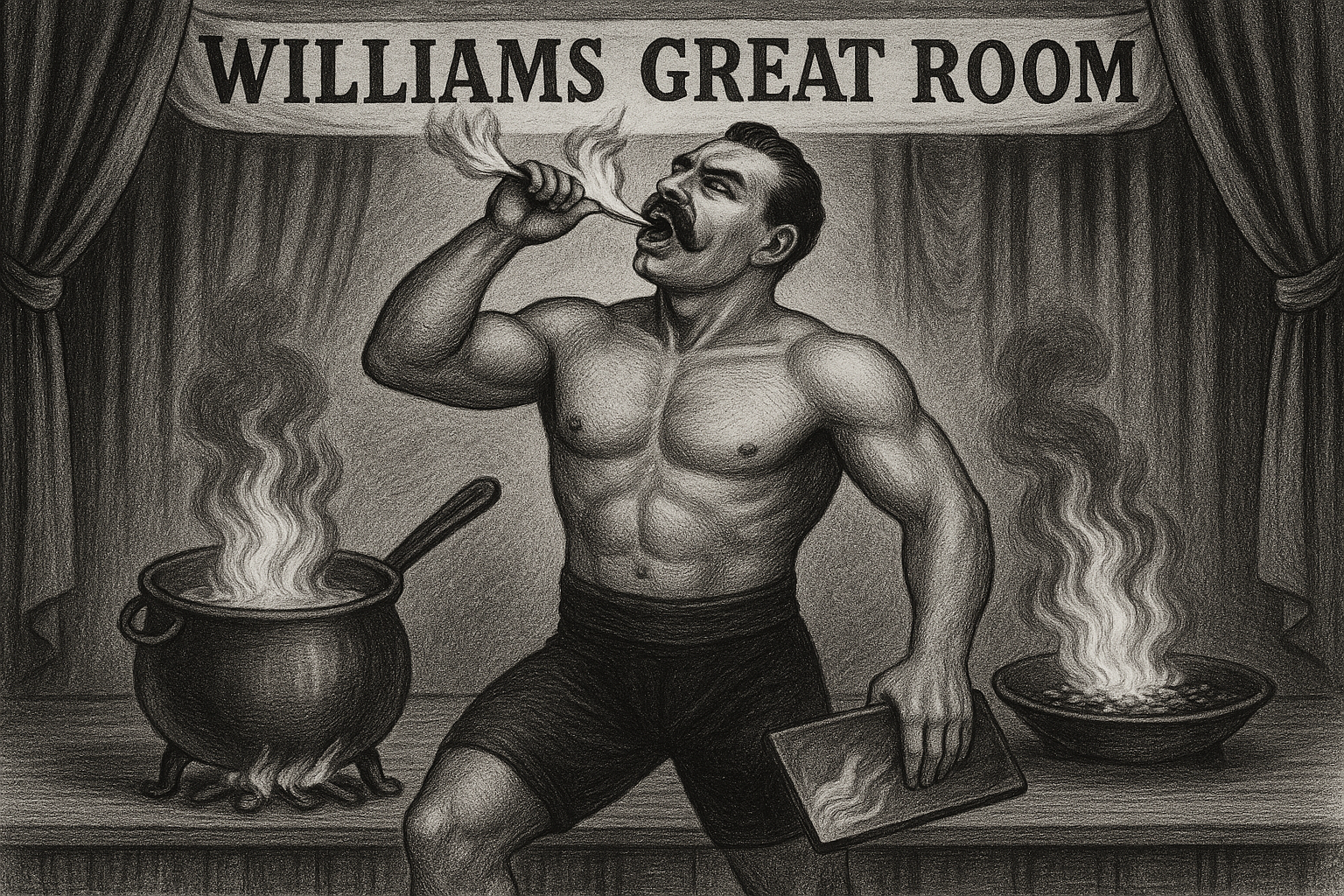
This is a report from the Merlin about his visit.
We last night attended at Williams's great room, to witness the performance of this celebrated personage. He executed several feats, evincing a wonderful degree of muscular strength, which greatly delighted as well as astonished his audience. But the most wonderful part of his performance was that which succeeded, and in which he evinced a thorough empire and command over the devouring element —fire.
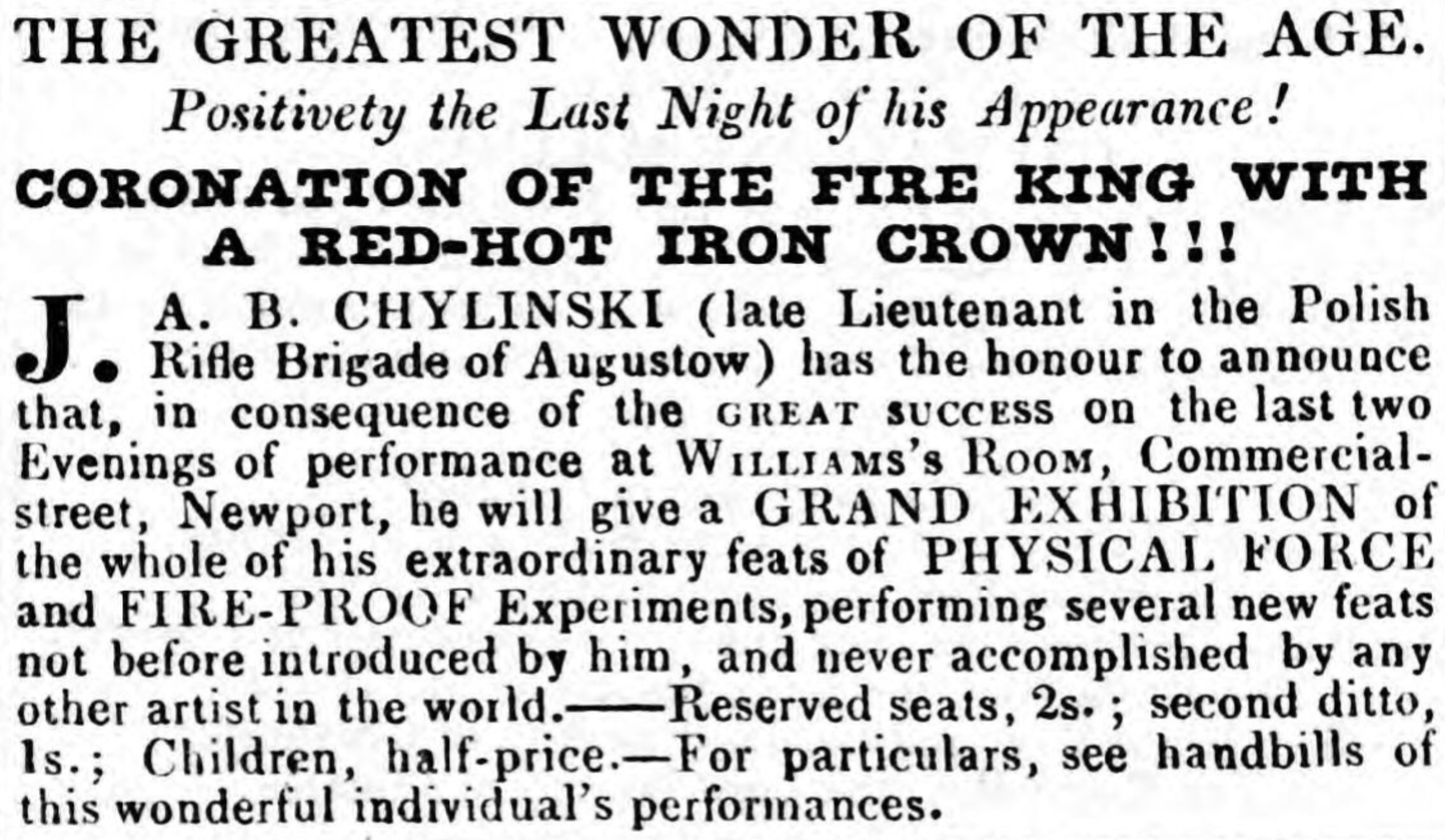
He appears quite at ease while his hands are immersed in boiling lead, nor has he any objection to take an occasional sup of it. Draughts of boiling oil he dispatches like lightning, and devours burning pitch with the avidity of a gourmand. Internally he is proof against fire, and the familiarity with which he takes hold of red hot iron bars, beats red hot plates of iron as thin as a sixpence with his fist, rubs hot plates over his face, hands, and legs, and likewise stands upon them, prove that externally it has as little effect upon him. Mr. Chylinski is indeed a Fire conqueror," and his performance will well repay a visit.
— Monmouthshire Merlin, 31st October, 1840

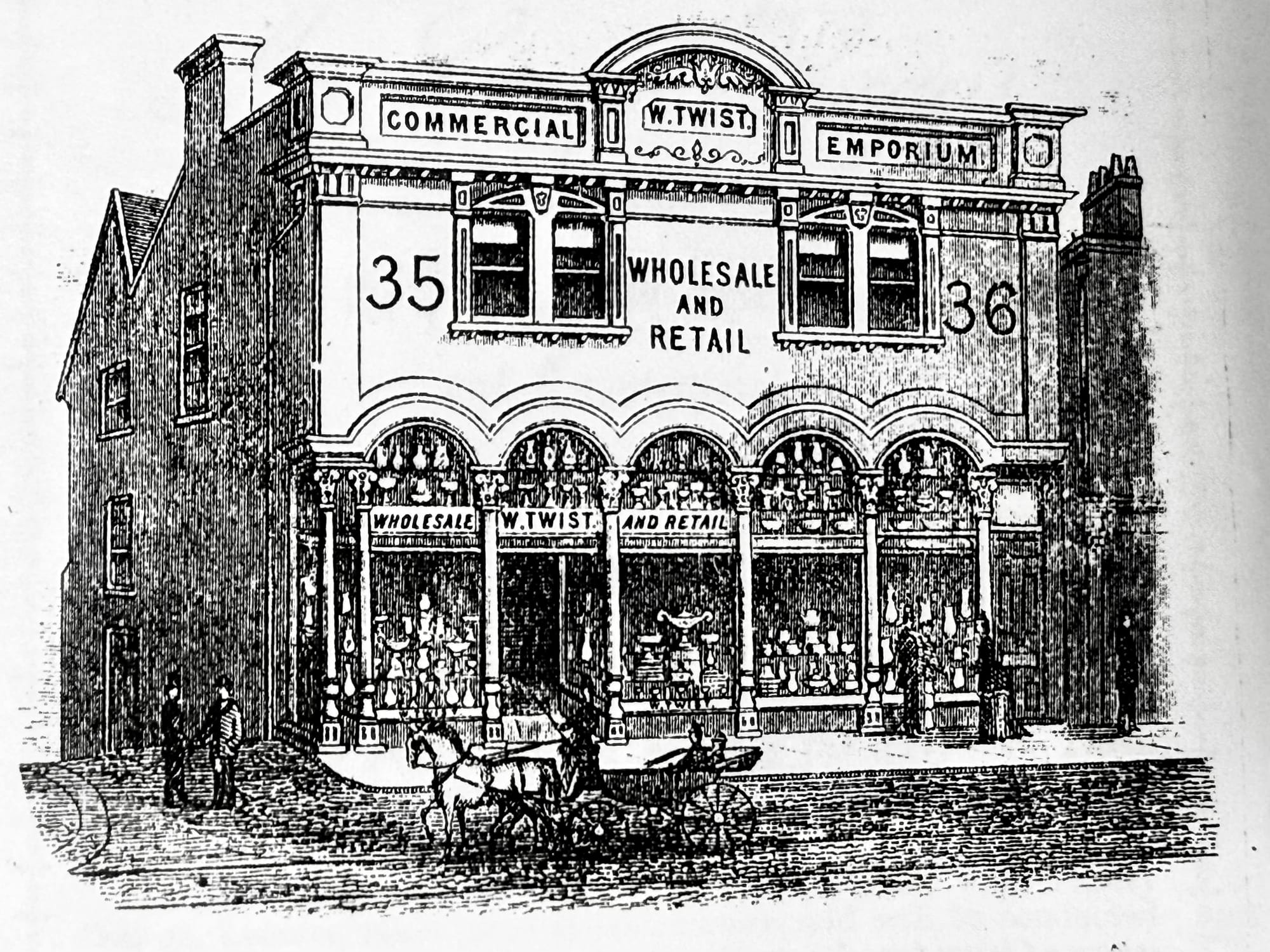

Early Mentions of Malpas
The Gloucester Journal is a good source for giving an insight into 18th century Newport whilst searching for early references to Malpas found these adverts and articles. Unfortunately it's difficult to work out the locations of the houses mentioned but at the time of the tithe map of around 1840 Malpas was still sparsely populated.
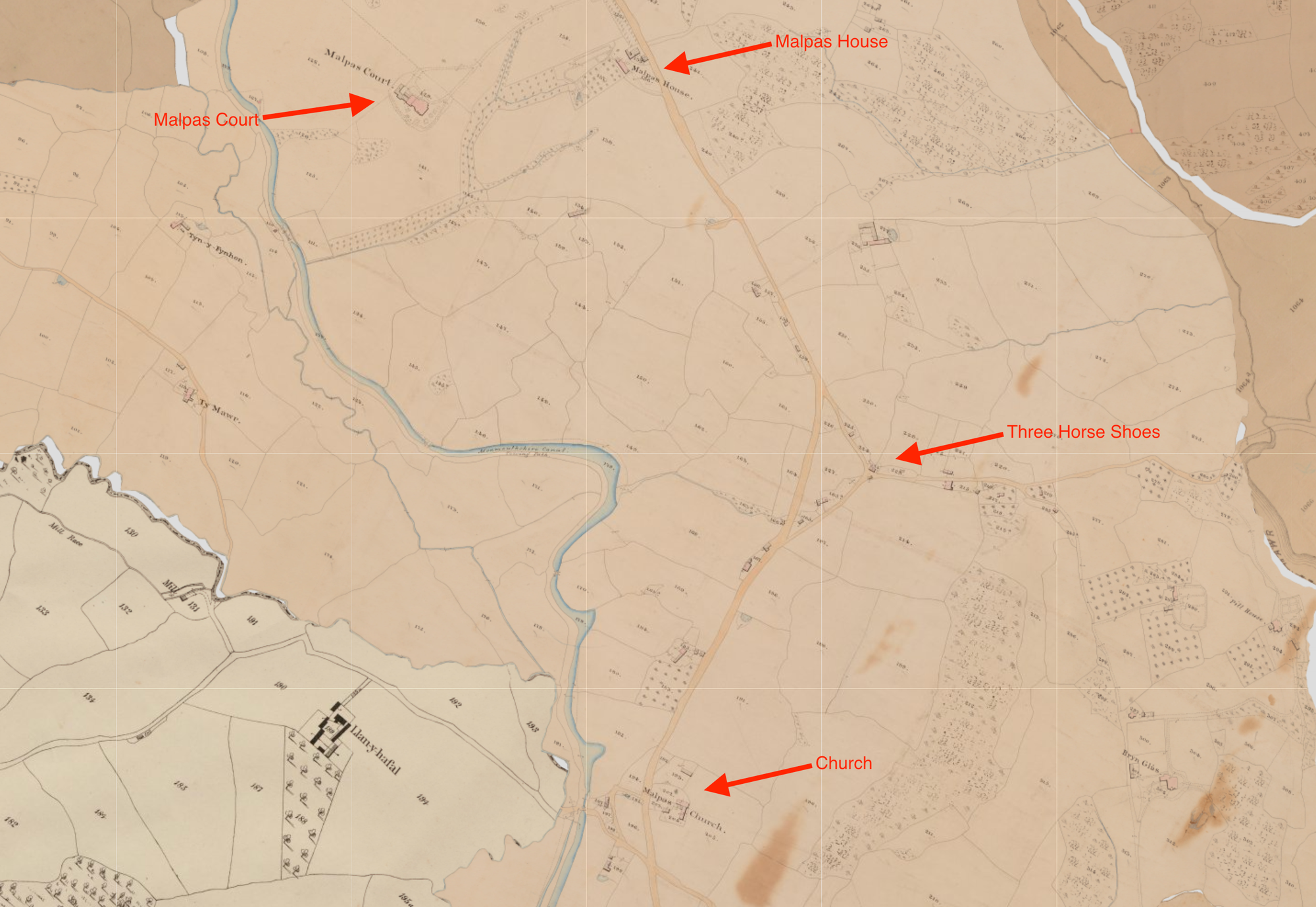
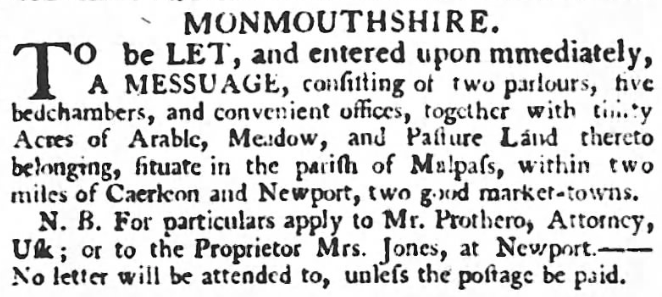
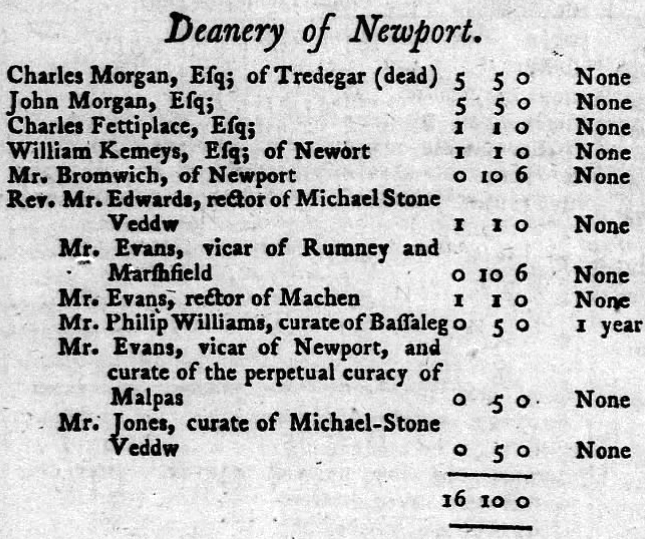
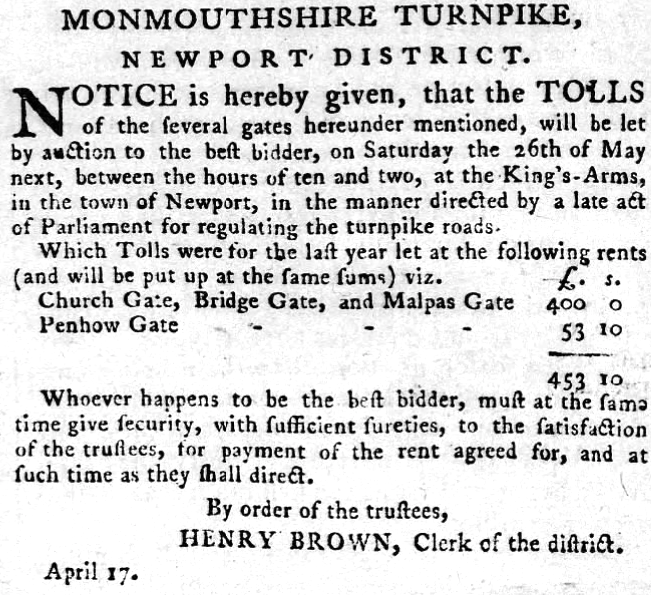
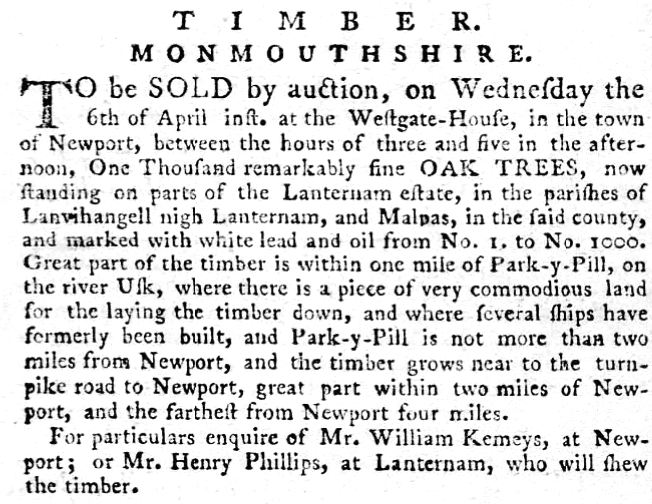
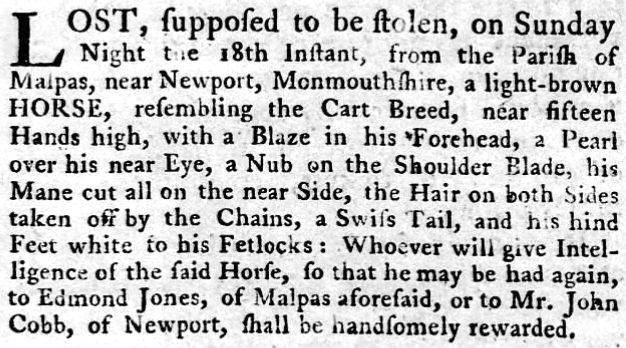
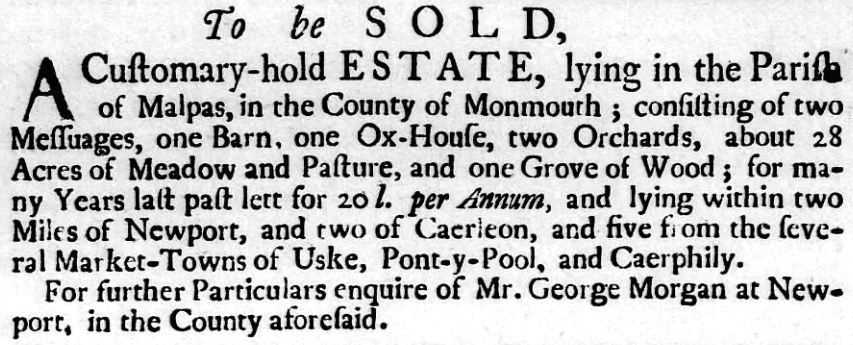

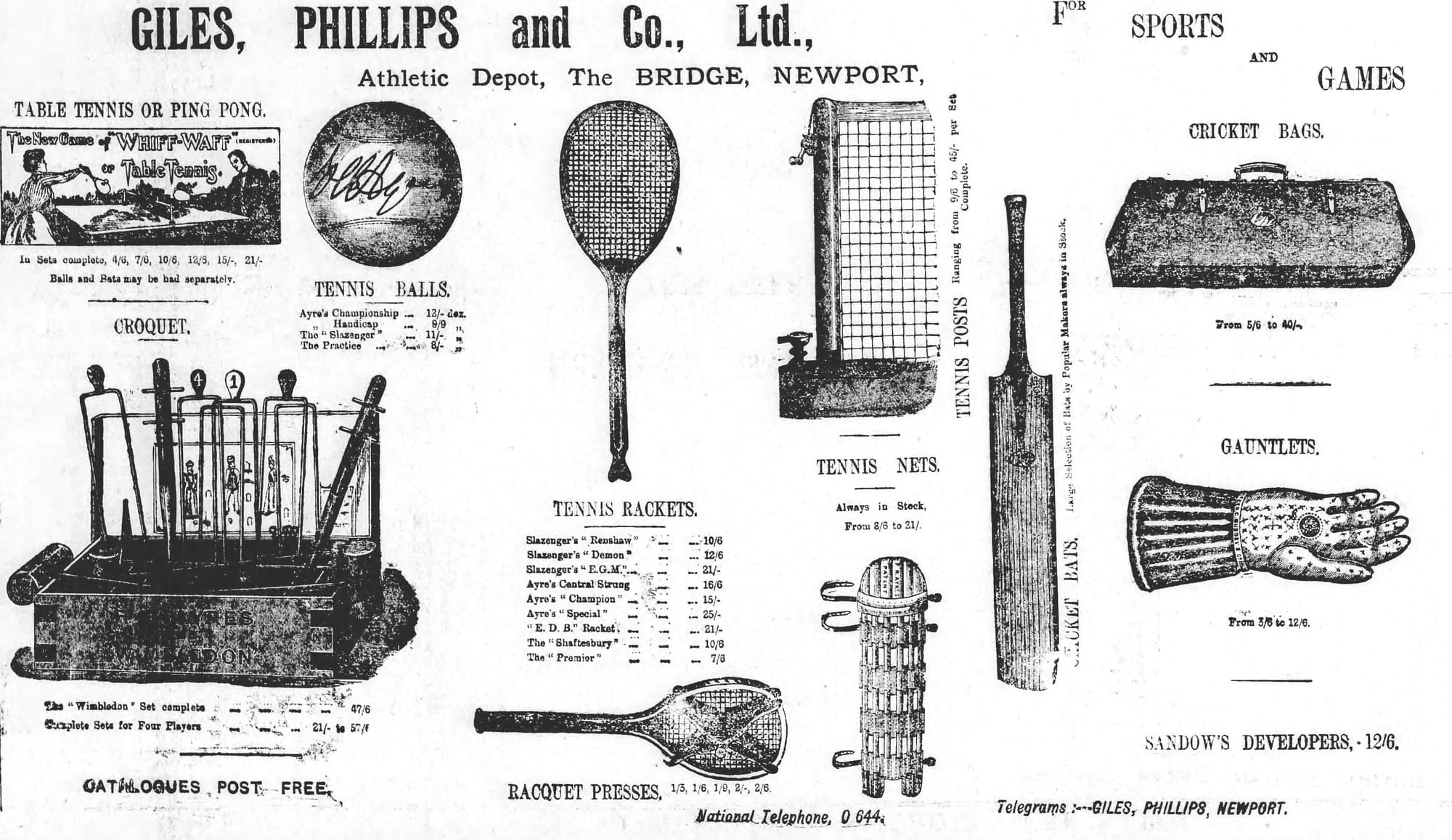


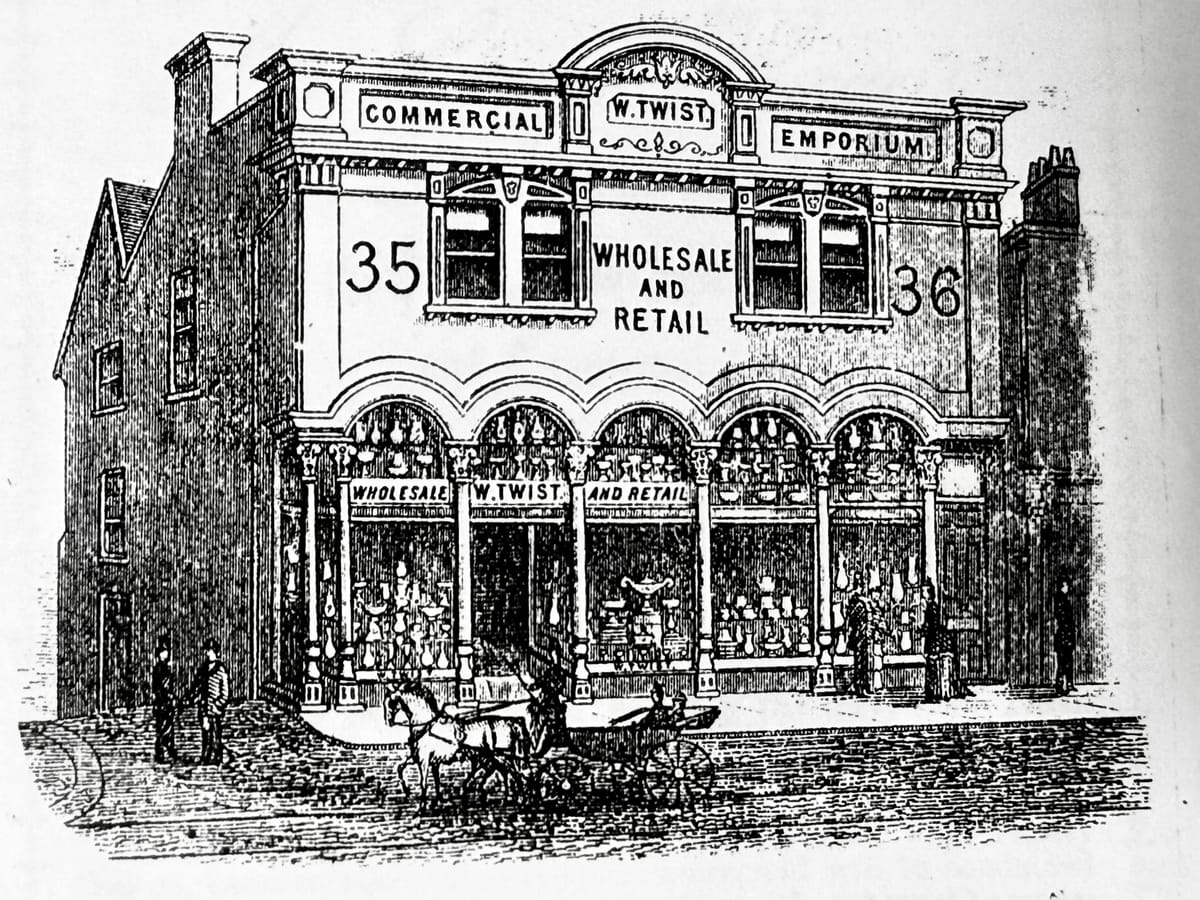
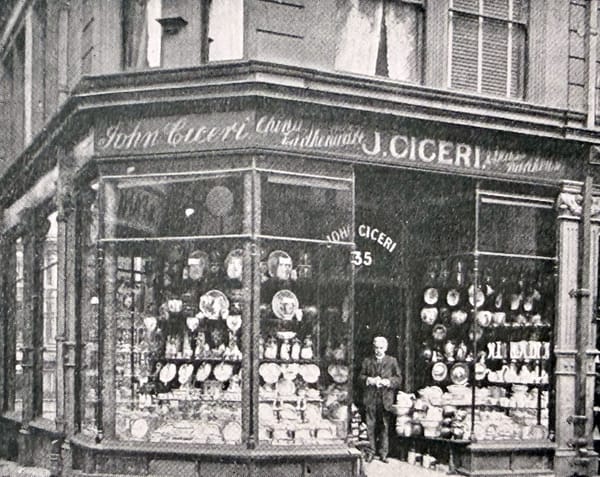
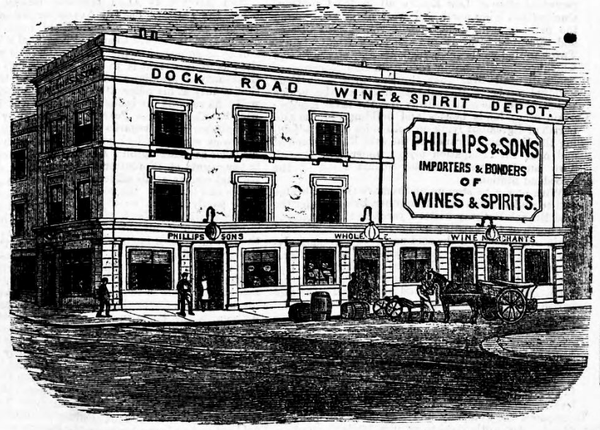
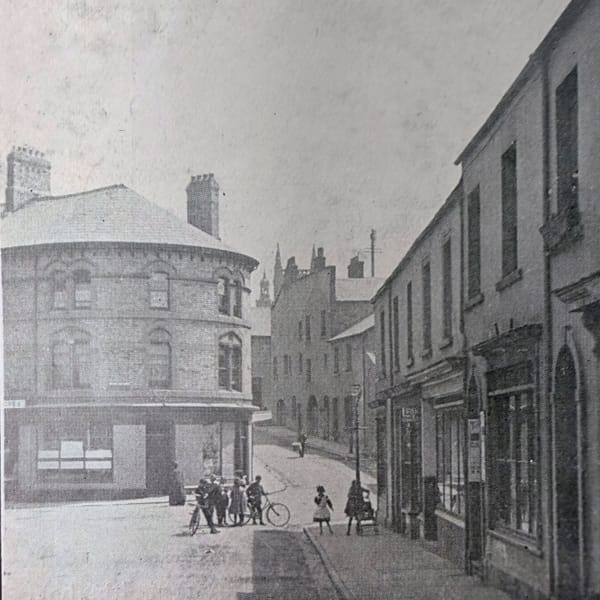
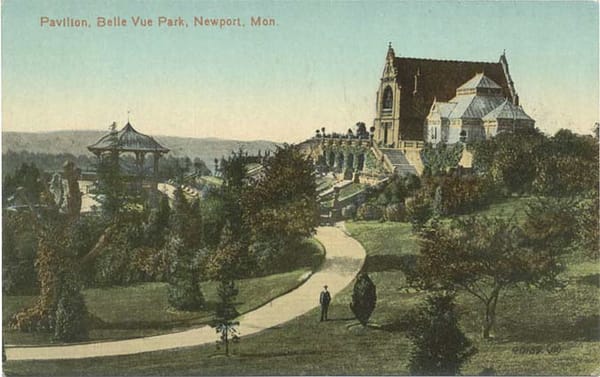
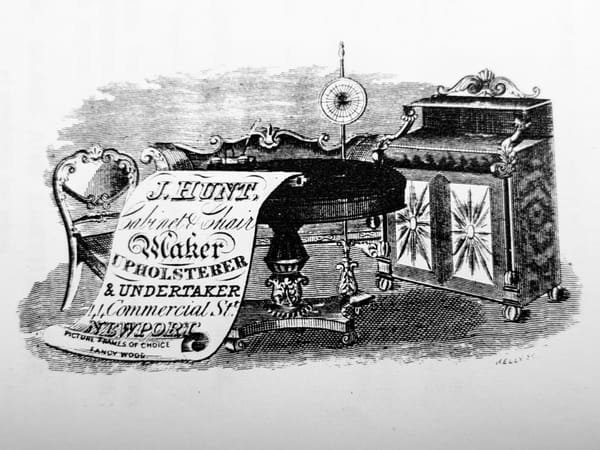
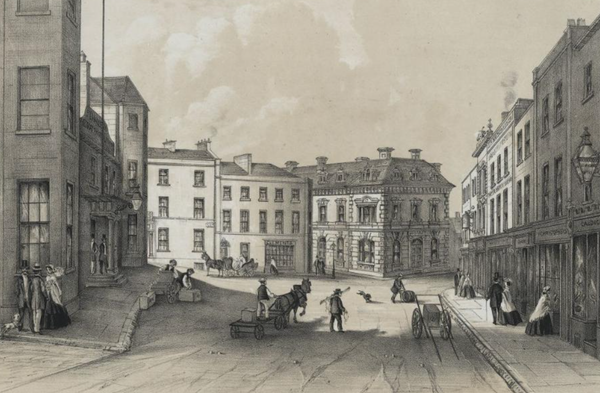
Member discussion